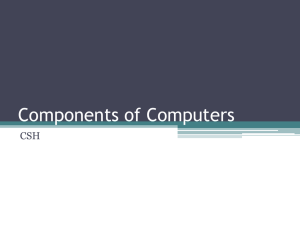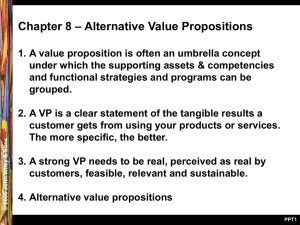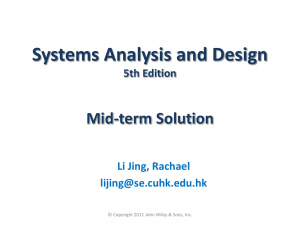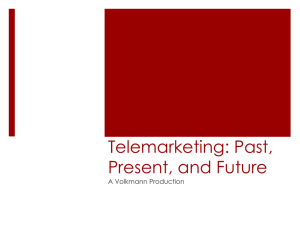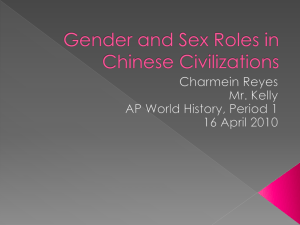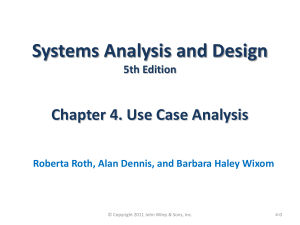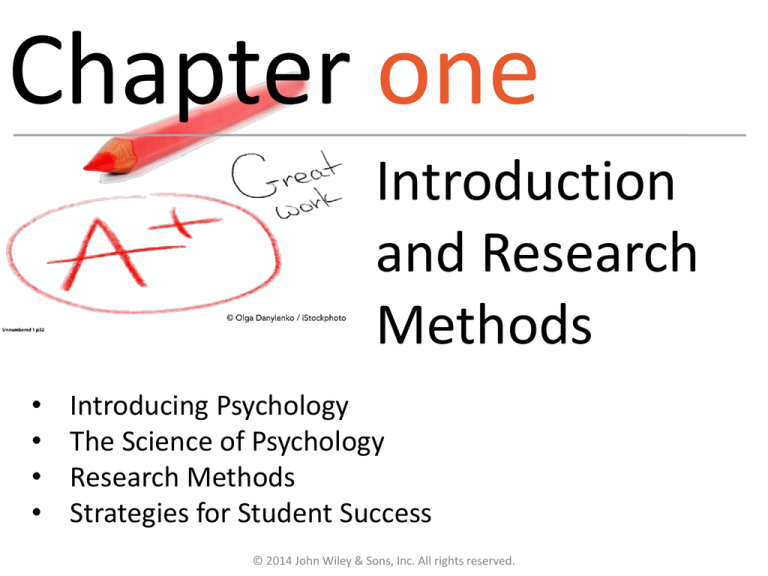
Chapter one
Introduction
and Research
Methods
•
•
•
•
Introducing Psychology
The Science of Psychology
Research Methods
Strategies for Student Success
© 2014 John Wiley & Sons, Inc. All rights reserved.
realworldpsychology
Things You’ll Learn in Chapter 1
Q1
How does your culture influence what you look
for in a romantic partner?
Q2
Can diet, preschool education, and parental
behavior increase a child’s intelligence?
Q3
Are older people happier than younger people?
Q4
Why do heavy drinkers misreport their alcohol
use?
Q5
How do spreading your study sessions and
practice testing improve test scores?
© 2014 John Wiley & Sons, Inc. All rights reserved.
What is Psychology?
• Psychology = scientific study of behavior and
mental processes
Why scientific study?
What is behavior?
What are mental processes?
© 2014 John Wiley & Sons, Inc. All rights reserved.
Psychology as Science
• Psychology uses empirical evidence that can
be objectively tested and evaluated
• Don’t confuse psychology with
“pseudopsychologies” (pseudo = false), like
horoscopes, psychic powers, and self-help
“pop psych”
• Let’s test your myths about psychology…
© 2014 John Wiley & Sons, Inc. All rights reserved.
© 2014 John Wiley & Sons, Inc. All rights reserved.
Psychology’s Past
• Structuralism: first framework for studying psychology;
uses introspection to understand sensation, perception
• Wilhelm Wundt, 1879, Leipzig, Germany
– ‘Father of Psychology’
– Established first psych laboratory
• Edward Titchener, United States
– Student of Wundt’s, spread structuralism’s goal of identifying
the basic building blocks of mental life
• Structuralism died out because not useful for studying
animals, children, or disorders
© 2014 John Wiley & Sons, Inc. All rights reserved.
Psychology’s Past
• Functionalism: how the mind functions and
allows animals/humans to adapt to
environment
• William James established first psychology lab
in United States
• Expanded psychology research to
include emotions and observable
behavior, began psychological testing
© 2014 John Wiley & Sons, Inc. All rights reserved.
Psychology’s Past
• Psychoanalytic perspective: the unconscious
part of the mind has thoughts, memories,
desires that lie outside personal awareness
but have strong influence
• Sigmund Freud, Austria, late 1800–early 1900
© 2014 John Wiley & Sons, Inc. All rights reserved.
Gender and Minority Influences
• Mary Calkins: completed requirements for PhD under
William James at Harvard but was denied her degree
because of her gender.
– Became prominent memory researcher
– Served as first female president of APA in 1905
• Margaret Floy Washburn: first female to receive PhD in
psychology
• Francis Cecil Sumner: first African American to earn
PhD in psychology in 1920
• Kenneth B. Clark: student of Sumner’s, became first
Black president of APA; researched harmful effects of
prejudice
© 2014 John Wiley & Sons, Inc. All rights reserved.
© 2014 John Wiley & Sons, Inc. All rights reserved.
© 2014 John Wiley & Sons, Inc. All rights reserved.
BioPsychoSocial Model
• No one perspective on psychology can
completely explain the complex human
condition
Biological Psychological
Social
© 2014 John Wiley & Sons, Inc. All rights reserved.
Culture
• Focus on the individual does
not provide full information
about emotions and motivation
• Must consider the individual in
the context of the group
• Individual vs. collectivist
cultures
• Fill in the blank: “I am _____.”
© 2014 John Wiley & Sons, Inc. All rights reserved.
realworldpsychology
Q1
How does your culture influence what you look
for in a romantic partner?
• In countries with low levels of gender
equality, women are more likely to be
attracted a partner based on resources
than on physical attractiveness
(Zentner & Mitura, 2012)
© 2014 John Wiley & Sons, Inc. All rights reserved.
© 2014 John Wiley & Sons, Inc. All rights reserved.
© 2014 John Wiley & Sons, Inc. All rights reserved.
© 2014 John Wiley & Sons, Inc. All rights reserved.
THE SCIENCE OF PSYCHOLOGY
© 2014 John Wiley & Sons, Inc. All rights reserved.
Types of research
• Basic research = focuses on
fundamental principles and theories to
advance core scientific knowledge
– Ex: classical and operant conditioning
principles explain human and animal
behavior
• Applied research = designed to solve
practical, real-world problems
– Ex: behavior modification research uses
operant conditioning to change behavior
and treat psychological disorders
© 2014 John Wiley & Sons, Inc. All rights reserved.
The Scientific Method
© 2014 John Wiley & Sons, Inc. All rights reserved.
realworldpsychology
Can diet, preschool education, and parental
behavior increase a child’s intelligence?
• After multiple studies have been conducted
(replicated), a meta-analysis can combine and
analyze data to determine overall trends
• Meta-analysis on children’s intelligence
found healthy diet, quality preschool
and interactive reading with parents
increase intelligence (Protzko et al., 2013)
Q2
© 2014 John Wiley & Sons, Inc. All rights reserved.
More about Scientific Method
• Hypothesis must be testable prediction
• Variables must be operationally defined
• Although the term “theory” may be used to
mean a guess in everyday language,
psychological theories are evidence-based,
rigorously tested, and self-correcting
• Statistical significance demonstrates that a
study’s results didn’t occur by chance
© 2014 John Wiley & Sons, Inc. All rights reserved.
Psychology’s 4 Main Goals
1. Description – what occurred
2. Explanation – why something occurred
(examine causes)
3. Prediction – under what conditions is the
phenomenon likely to occur again?
4. Control – how to increase desired outcomes
and decrease negative outcomes
© 2014 John Wiley & Sons, Inc. All rights reserved.
RESEARCH METHODS
© 2014 John Wiley & Sons, Inc. All rights reserved.
Descriptive Research
Systematic, scientific observation and description
• Naturalistic observation: observe and record
behavior in natural setting, without interference
• Survey/interview: ask people to report
behaviors, opinions and attitudes
• Case studies: in-depth study of small number of
participants
• Archival research: using previously recorded
data
© 2014 John Wiley & Sons, Inc. All rights reserved.
Correlational Research
• When two variables are related, a change in
one is accompanied by a change in the other
• Can make predictions about one variable
based on known changes in the other
Q3
Are older people happier than younger
people?
• In a study of 5,000 people in the
U.S., as age increases, happiness
increases
© 2014 John Wiley & Sons, Inc. All rights reserved.
Interpreting Correlations
• Correlation coefficient is statistical number
showing direction and strength of relationship
between two variables
• “Correlation does not mean causation”
© 2014 John Wiley & Sons, Inc. All rights reserved.
Experimental Research
• Required to determine causation
• Independent variable is manipulated
• Dependent variable is observed and
measured
• Experimental group = the group that
receives the treatment
• Control group = the group that does not
receive the treatment
• Random assignment = ensures that change
in DV is due to IV, not some characteristic of
the group
© 2014 John Wiley & Sons, Inc. All rights reserved.
Controlling Bias
Q4
Bias
Why do heavy drinkers misreport their
alcohol use?
Controls
• Sample bias = research participants
don’t reflect larger population
• Experimenter bias = researcher
influences outcome in expected
direction
• Participant bias = experimental
condition influences participant’s
behavior
• Social desirability = participant
provides dishonest answers to
personal, risky, or embarrassing
questions
• Placebo = inactive substance to
prevent false positive results from
treatment condition
• Single-blind study = participants
don’t know what group they are in
• Double-blind study = neither
researcher nor participants know
group assignments
© 2014 John Wiley & Sons, Inc. All rights reserved.
Summary of Research Methods
© 2014 John Wiley & Sons, Inc. All rights reserved.
realworldpsychology
POLITICS AND DATING RELATIONSHIPS
Huber & Malhotra, 2012
• Study 1: Participants viewed online dating
profiles of fictional people, including religion,
education, political preference. Participants rated how
much they would like to date someone and that
person’s physical attractiveness.
• Study 2: using data from an existing website
(OkCupid), measured relationship between shared
political views and interest in dating
© 2014 John Wiley & Sons, Inc. All rights reserved.
Ethical Guidelines
• Informed consent
• Voluntary participation
• Restricted use of deception, with debriefing
– In Milgram’s famous study of obedience, participants were
told they were giving electric shocks to another. Deception
was necessary in order to measure true behavior.
• Confidentiality
© 2014 John Wiley & Sons, Inc. All rights reserved.
Animal Research
• Nonhuman animals are used in only 7 to 8% of
psychological research (mostly rats and mice)
• Animal research produces breakthroughs in medical
research, drugs, understanding the brain, sensation
and perception, learning, stress and many others
• Psychologists follow strict
procedures for ethical
treatment of animal
research subjects
© 2014 John Wiley & Sons, Inc. All rights reserved.
Psychotherapy Clients
• Therapists must maintain license
• Therapy records are confidential
• Therapists are legally bound to
break confidentiality if client
threatens harm to self or others,
or is suspected of abusing a child
or elderly person
© 2014 John Wiley & Sons, Inc. All rights reserved.
STRATEGIES FOR STUDENT
SUCCESS
© 2014 John Wiley & Sons, Inc. All rights reserved.
Study Habits
1. Familiarization = review the chapter to take full
advantage of content. Preface, table of contents,
references, etc. help you find things in the text. Read
boxes, tables and figures within text for full
understanding of the subject
2. Active reading = Don’t read a textbook the way you
would read a novel! Slow down, focus on details,
make notes.
– SQ4R: Survey, Question, Read, Recite,
Review, wRite
© 2014 John Wiley & Sons, Inc. All rights reserved.
Study Habits
Q5
How do spreading your study sessions
and practice testing improve test scores?
3. Distributed Practice = Don’t cram! Instead, spread
your practice/study over time
4. Practice test taking = Practice test taking and
Distributed practice are two of the most efficient
ways to study and learn.
© 2014 John Wiley & Sons, Inc. All rights reserved.
Time Management
• Establish a baseline to understand how you
spend your time now
• Set up a realistic schedule with daily and
weekly “to do” list
• Reward yourself for following your schedule
• Maximize your time by avoiding distraction,
wasted efforts
What time
management
techniques work
best for you?
© 2014 John Wiley & Sons, Inc. All rights reserved.
© 2014 John Wiley & Sons, Inc. All rights reserved.

